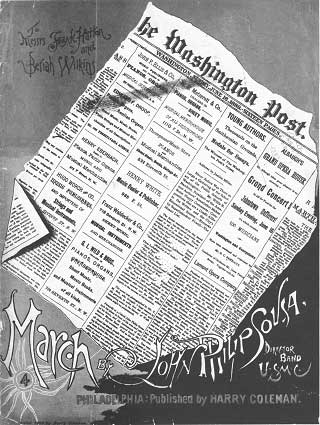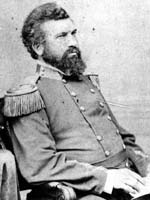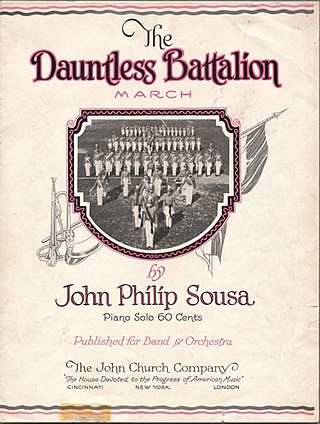
John Philip Sousa was an American composer and conductor of the late Romantic era known primarily for American military marches. He is known as "The March King" or the "American March King", to distinguish him from his British counterpart Kenneth J. Alford. Among Sousa's best-known marches are "The Stars and Stripes Forever", "Semper Fidelis", "The Liberty Bell", "The Thunderer", and "The Washington Post".

"The Washington Post" is a march composed by John Philip Sousa in 1889. Since then, it has remained as one of his most popular marches throughout the United States and many other countries.
A screamer is a circus march intended to stir up the audience during the show.

Frederick Joseph Ricketts was an English composer of marches for band. Under the pen name Kenneth J. Alford, he composed marches which are considered to be great examples of the art. He was a Bandmaster in the British Army, and Royal Marines Director of Music. Conductor Sir Vivian Dunn called Ricketts "The British March King". Ricketts' frequent use of the saxophone contributed to its permanent inclusion in military bands. His best known work is the "Colonel Bogey March".

Frederick Fennell was an American conductor and one of the primary figures which promoted the Eastman Wind Ensemble as a performing group. He was also influential as a band pedagogue, and greatly affected the field of music education in the US and abroad. In Fennell's New York Times obituary, colleague Jerry F. Junkin was quoted as saying "He was arguably the most famous band conductor since John Philip Sousa."

The United States Marine Band is the premier band of the United States Marine Corps. Established by act of Congress on July 11, 1798, it is the oldest of the United States military bands and the oldest professional musical organization in the United States. Today, the Marine Band includes the Marine Chamber Orchestra and Marine Chamber Ensembles.

"The Fairest of the Fair" is a 1908 march by John Philip Sousa. One of Sousa's more melodic, less military marches, it was composed for the annual Boston Food Fair of 1908. It is claimed that the memory of a pretty girl he had seen at an earlier fair inspired the composition.

Lieutenant Colonel (Dr) Ray Steadman-Allen was a British composer of choral and brass band music for the Salvation Army and for band competition.

"National Emblem", also known as the National Emblem March, is a U.S. march composed in 1902 and published in 1906 by Edwin Eugene Bagley. It is a standard of the U.S. march repertoire, appearing in eleven published editions. The U.S. military uses the trio section as ceremonial music for the entry of the ceremony's official party.

A bandmaster is the leader and conductor of a band, usually a concert band, military band, brass band or a marching band.

The Salvation Army, Parramatta is a Salvation Army Corps located in the suburb of Parramatta, New South Wales, Australia. It is the 75th oldest active Salvation Army Corps in Australia. Situated in the western suburbs of Sydney, it has survived two arson attacks, been led by some of the most prominent Australian Salvation Army officers of the modern era, and has actively ministered to the people of Parramatta and the surrounding regions since 1884.

A Salvation Army brass band is a brass band affiliated with a Corps, Division or Territory of the Salvation Army. In society, a Salvation Army band playing in public places during Christian events in the calendar such as Christmas has become a part of seasonal customs, particularly in the UK.

"The High School Cadets" is a march written in 1890 by John Philip Sousa in honor of the cadet drill team of Washington High School in the District of Columbia. It is in regimental march form (I-AA-BB-CC-DD) and is a popular selection for school concert and marching bands, as well as for professional orchestras and bands. The march has been arranged for a wide variety of instruments and ensembles, and has been frequently recorded, including at least two recorded performances by Sousa's own band. The march's final strains were featured in the 1939 film The Under-Pup.

"Semper Fidelis", written in 1888 by John Philip Sousa, is regarded as the official march of the United States Marine Corps. This piece was one of two composed in response to a request from United States President Chester A. Arthur for a new piece to be associated with the United States President. The words semper fidelis are Latin for "always faithful." The piece was created for a wind band in addition to a percussion section. There is a very prominent drum solo in the middle of the piece which includes a skillful dynamic change. It features staccato notes and sharp tonguing.
The Hendon Band of The Salvation Army is a non-professional Christian brass band that forms part of the Hendon Corps, a Salvation Army church in Hendon, a suburb of North West London, England. The band was founded in 1885.

Francesco Maria Scala also known as Francis M. Scala, was an Italian-born naturalized American military band director and musician. He was the first and one of the most important and influential directors of the United States Marine Band. He defined the instrumental organization that the band maintains, he was an extremely prolific musician and composer, and improved and enlarged the repertoire of the ensemble. It is thought that under his direction the USMC Band executed for the first time "The Gendarmes' Duet" from Act II of the revision in 1867 of the Jacques Offenbach opera Geneviève de Brabant, which debuted in Paris in 1859. This melody is now known as the Marines' Hymn.

The John Philip Sousa Baton is a conducting baton originally presented to John Philip Sousa upon his resignation as the director of the United States Marine Band. After his death, it was donated to the Marine Band, and since it has been traditionally passed to the new director from the outgoing director of the band during the change of command ceremonies.
Robert Henry McAnally was an Australian composer and conductor.

"The Dauntless Battalion" is an American military march by John Philip Sousa, published in 1922 and dedicated to the faculty and cadets of the Pennsylvania Military College in Chester, Pennsylvania, known today as Widener University. Sousa received an honorary doctorate from the college in February 1920 alongside future president Warren G. Harding.
















